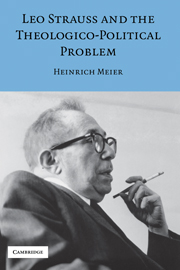Book contents
- Frontmatter
- Contents
- Preface to the American Edition
- I THE THEOLOGICO-POLITICAL PROBLEM: ON THE THEME OF LEO STRAUSS
- II THE HISTORY OF PHILOSOPHY AND THE INTENTION OF THE PHILOSOPHER: REFLECTIONS ON LEO STRAUSS
- III WHAT IS POLITICAL THEOLOGY?
- IV WHY POLITICAL PHILOSOPHY?
- APPENDIX: TWO UNPUBLISHED LECTURES BY LEO STRAUSS
- Index of Names
II - THE HISTORY OF PHILOSOPHY AND THE INTENTION OF THE PHILOSOPHER: REFLECTIONS ON LEO STRAUSS
Published online by Cambridge University Press: 05 March 2013
- Frontmatter
- Contents
- Preface to the American Edition
- I THE THEOLOGICO-POLITICAL PROBLEM: ON THE THEME OF LEO STRAUSS
- II THE HISTORY OF PHILOSOPHY AND THE INTENTION OF THE PHILOSOPHER: REFLECTIONS ON LEO STRAUSS
- III WHAT IS POLITICAL THEOLOGY?
- IV WHY POLITICAL PHILOSOPHY?
- APPENDIX: TWO UNPUBLISHED LECTURES BY LEO STRAUSS
- Index of Names
Summary
Philosophy is the highest form of the mating of courage and moderation. In spite of its highness and nobility, it could appear as Sisyphean or ugly, when one contrasts its achievement with its goal. Yet it is necessarily accompanied, sustained and elevated by eros. It is graced with nature's grace.
– Leo Strauss, What Is Political Philosophy?Leo Strauss occupies an exceptional position in the history of philosophy. No philosopher before him has made the history of philosophy the object of his study with a similar penetration and urgency, not to say exclusiveness, nor has anyone among those who have demonstrated a comparable power in confronting the thought of other philosophers engaged in this confrontation with Strauss's constant consideration of political philosophy. The question that Strauss seeks to answer with his historical interpretations explicitly reads “What is political philosophy?” and not “What is metaphysics?” But why does Strauss engage in a massive, wide-ranging historical research project, which extends from Heidegger via Machiavelli and Alfarabi to the pre-Socratics, in order to answer a question that in itself is by no means a historical one? For a reflection that stays on the surface of his oeuvre even for only a few moments, the central issue becomes the intention that the philosopher Strauss pursues when he turns his – so it seems – serious and undivided attention to the history of philosophy.
- Type
- Chapter
- Information
- Leo Strauss and the Theologico-Political Problem , pp. 53 - 74Publisher: Cambridge University PressPrint publication year: 2006

